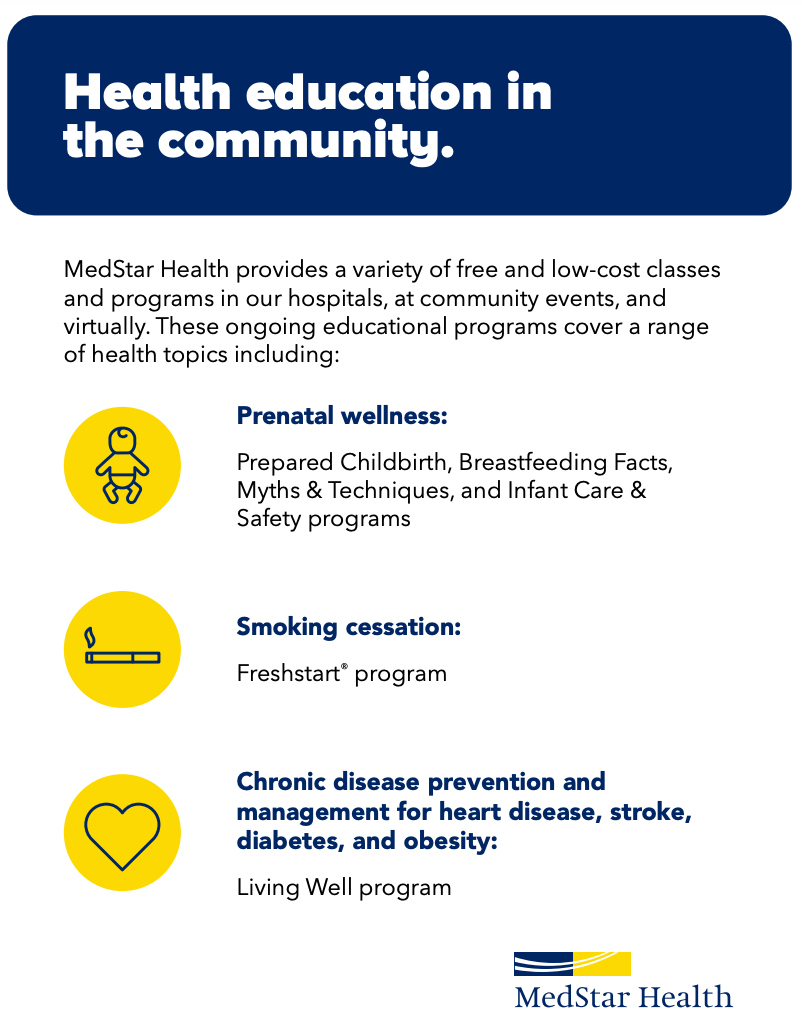Pictured above, members of the MedStar Health community health team host a virtual childbirth education class.
Expectant mothers, especially those having a baby for the first time, have a laundry list of questions, concerns, and fears about delivering and caring for their newborns. Many enroll in classes to get the information they need to prepare for their babies’ big arrival. But once the country began suspending indoor services due to the COVID-19 pandemic, many parents-to-be found themselves wondering whether they could still access these valuable resources.
Amanda Huster was one of those expectant parents.
“This was my first child, and there was a lot that I didn’t know,” said the 28-year-old Essex resident, who was four months pregnant when she began looking into classes offered at MedStar Franklin Square Medical Center. “I would have preferred to take classes in person but that wasn’t possible.”
With the help of technology, our Community Health team at MedStar Franklin Square and other MedStar Health locations throughout the area were still able to conduct these all-too important classes—and participants never had to leave their homes.
Huster did not waste time signing up. She registered for all virtual classes offered by her hospital, covering topics such as childbirth, breastfeeding and infant care and safety.
“The classes were much better than what I had expected,” she says. “They did a great job of sending out all of the materials beforehand, so I was prepared. And it was easy to see the instructor and ask her questions.”
Although she says in-person classes would have been preferred, she’s happy the virtual option was offered in its place.
“Considering everything going on in the world right now, and me being pregnant, it was much safer to take these classes at home,” says Huster, adding that when her baby boy Caleb arrived in September, the information she learned in her virtual classes came in handy in her real-life role as mom. “I just felt like I was more prepared to deal with everything. I would definitely take the classes again, whether they are offered virtually or not.”
Find care now
If you are experiencing a medical emergency, please call 911 or seek care at an emergency room.
Birth and family classes are not the only MedStar Health education programs that transitioned to a virtual format due to the pandemic. Karen Polite-Lamma, chronic disease program coordinator at MedStar Health, was three weeks into instructing a six-week Smoking Cessation class at MedStar Franklin Square when statewide restrictions suspended most indoor gatherings.
“We had to switch gears quickly and figure out a way to move forward,” she says. She began conducting the remaining classes via conference call with participants, and the transition was seamless. “Everyone adapted quickly. They really appreciated having the ability to continue the program to the end.”
Polite-Lamma says this shift in the way her team now offers these classes has shown her the value in giving interested participants a virtual class option, even after the pandemic.
“Some people really like the convenience of virtual classes, and others prefer in-person. So we’re going to offer both moving forward,” says Polite-Lamma, who also oversees MedStar Health’s Diabetes Prevention program, which transitioned to virtual classes, as well.














